Our distinguished faculty include educators, scientists, professors, classroom teachers, and museum professionals. Our faculty bring their knowledge and expertise, and have a deep appreciation for learning and the exchange of ideas between cultures. Some of our faculty have made several trips from their homes in Europe and USA to India, Nepal, or Bhutan. Faculty have been a vital part in developing the pedagogy of the our leadership programs. Many of our regular faculty come from ongoing collaborations with the National Writing Project, the Exploratorium’s Teacher Institute, and the Smithsonian Institution. The faculty listed here have participated in one or more of our programs (2008 – present):
Mark St John, Inverness Research
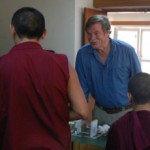
Dr. Mark St. John, founder and president of Inverness Research Inc., has a broad background in science and mathematics education at all levels. For over 20 years he has been involved in the evaluation and study of public and private initiatives aimed at improving science and mathematics education. He also advises philanthropies about investments in educational improvement. Dr. St. John and his colleagues at Inverness Research Inc. have been involved in many evaluations of reform initiatives in education—from the study of large scale initiatives undertaken by the National Science Foundation and the U.S. Department of Education to the evaluation of individual science museum exhibits. They have been involved in studying professional development and teacher leadership networks, curriculum design projects, informal science education efforts, multi-institutional partnerships and centers, and systemic reform initiatives at the state, district, and school levels.
Years Participation: 2008 – present
Christopher Impey, University of Arizona – Tucson
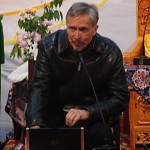 Chris Impey is a University Distinguished Professor at the University of Arizona and Deputy Head of the Astronomy Department. He works on quasars and distant galaxies and has written 160 research papers and two astronomy textbooks. He has won ten University of Arizona teaching awards and was chosen as Arizona’s “Professor of the Year” by Carnegie’s Foundation for the Improvement of Teaching. He is a former Vice President of the American Astronomical Society, and in 2002 he was one of six faculty nationwide chosen as an NSF Distinguished Teaching Scholar. He has over 20 years of continuous funding from NASA on a wide range of research education projects.
Chris Impey is a University Distinguished Professor at the University of Arizona and Deputy Head of the Astronomy Department. He works on quasars and distant galaxies and has written 160 research papers and two astronomy textbooks. He has won ten University of Arizona teaching awards and was chosen as Arizona’s “Professor of the Year” by Carnegie’s Foundation for the Improvement of Teaching. He is a former Vice President of the American Astronomical Society, and in 2002 he was one of six faculty nationwide chosen as an NSF Distinguished Teaching Scholar. He has over 20 years of continuous funding from NASA on a wide range of research education projects.
Years Participation: 2008, 2009, 2010, 2012, 2013, 2015, 2016, 2018
Eric Chudler, University of Washington - Seattle
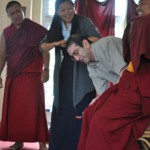
Eric H. Chudler, Ph.D., is a neuroscientist at the University of Washington and the executive director of the Center for Sensorimotor Neural Engineering in Seattle. In addition to conducting research related to how the brain processes information from the senses, he has worked with fellow scientists and teachers to create materials to help the public understand how the brain works. Chudler has conducted workshops and given presentations to a variety of audiences, including pre-college students, university students, teachers, judges, and Tibetan Buddhist monks and nuns. He has also published several books for general audiences, including Brain Bytes: Quick Answers to Quirky Questions About the Brain (W.W. Norton & Co., 2017) and The Little Book of Neuroscience Haiku (W.W. Norton & Co., 2013). Chudler graduated from the University of California, Los Angeles (UCLA) in 1980 with a B.S. degree in Psychobiology and attended the University of Washington, where he received an M.S. degree and a Ph.D. degree from the Department of Psychology. His post-doctoral work was performed at the National Institutes of Health.
Years Participation: 2011, 2012, 2013, 2014, 2015, 2016, 2018
Marieke Van Vugt, University of Groningen
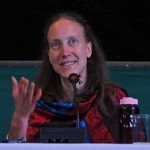
Marieke van Vugt is an assistant professor at the Institute of Artificial Intelligence and Cognitive Engineering (ALICE) of the University of Groningen (Netherlands). She obtained her PhD in neuroscience focusing on the role of brain oscillations in recognition memory with Dr. Michael Kahana at the University of Pennsylvania in 2008. She then went on to do postdoctoral research on the neural correlates of decision making with Dr. Jonathan Cohen at Princeton University before starting her own group as a tenure track assistant professor in Groningen in 2010.
Years Participation: 2014, 2015, 2016, 2017, 2018, 2019
Linda Shore, Astronomy Society of the Pacific
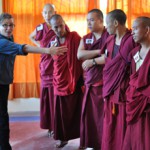
Linda Shore is CEO of the Astronomical Society of the Pacific. A native San Franciscan who has spent most of her life in the Bay Area, Linda holds a master’s degree in physics and astronomy from San Francisco State University and an Ed D in science education from Boston University. Before coming to the ASP, Linda was a Staff Scientist and Director of the Teacher Institute at the Exploratorium – San Francisco’s renowned science museum. During her 21-year tenure at the Exploratorium, she led the development and implementation of an internationally acclaimed science teacher professional development program, including an innovative beginning science teacher program and a teacher leadership program. Linda has co-authored several science activity books for children and written numerous popular science articles. She has also conducted research on student astronomy learning, science teacher induction and retention, and gender equity in science.
Years Participation: 2009, 2011, 2013, 2016, 2018, 2019
Richard Sterling, University of California - Berkeley
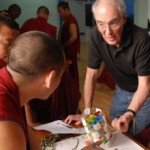
Richard Sterling is the Executive Director Emeritus of the National Writing Project (NWP), and Professor Emeritus at the University of California, Berkeley, in the Graduate School of Education. From 2003 to 2012, he served as chair of the Advisory Panel to the College Board’s National Commission on Writing. Formerly he was the founder and director of the Institute for Literacy Studies at Lehman College, an Organized Research Unit at the City University of New York, and a member of the faculty at Lehman College. He was also founder and director of the New York City Writing Project and the New York City Mathematics Project, both of which are housed within the Institute for Literacy Studies. During his tenure as Executive Director of the National Writing Project, the project increased its annual funding from $2.4 million to $23.5 million. This expansion resulted in a significant increase in services and resources to the nearly 200 writing project sites housed in universities across the country. Richard Sterling has lectured and presented papers at conferences and universities across the country and abroad. He is a co-author of “The National Writing Project: Scaling up and Scaling Down,” in Expanding the Reach of Reform: Perspectives from Leaders in the Scale-Up of Educational Reform (RAND, 2004). From 2005 to 2013 Richard Sterling served as a trustee of the Development Studies Center, Oakland CA, an organization whose mission is to provide materials and training to elementary schools to improve literacy and learning.
Years Participation: 2008, 2009, 2011, 2012, 2016
Tory Brady, Exploratorium

Victoria Brady has been a member of the Exploratorium Teacher Institute since 1998, developing and coordinating the New Teacher and Leadership Programs, and teaching content and/or pedagogy-based workshops to secondary science teachers. At this time she is on-call to the Teacher Institute, and mentors several teachers in their classrooms. Other Experience includes: Teaching General Science classes with “Science for Monks and Nuns” Program in various locations in India; Adjunct Faculty, Alliant International University, teaching Math and Science Content and Methodology; New Teacher Mentor and Coach, Alliant International University and Alameda County Office of Education, visiting intern teachers in their classrooms, assisting and evaluating them based on California State Standards for the Teaching Profession. Before coming to the Exploratorium, Victoria taught elementary and middle school, and before that she was a registered nurse.
Years Participation: 2012, 2013, 2014, 2017, 2019
David Presti, University of California – Berkeley
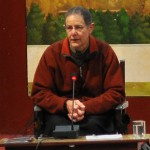
David Presti is a teaching professor of neurobiology, psychology, and cognitive science at the University of California, Berkeley, where he has been on the faculty for nearly 30 years. He also worked for more than a decade as a clinical psychologist in the treatment of addiction and of post-traumatic-stress disorder (PTSD) at the Department of Veterans Affairs Medical Center in San Francisco. His undergraduate training focused on physics, mathematics, and chemistry, and his graduate training on physics (MS, Caltech), molecular biology and biophysics (PhD, Caltech) and psychology (PhD, Oregon). He is author of Foundational Concepts in Neuroscience: A Brain-Mind Odyssey (Norton, 2016) and of Mind Beyond Brain: Buddhism, Science, and the Paranormal (Columbia, 2018).
Years Participation: 2009, 2015, 2016, 2018, 2019
David Barker, Exploratorium
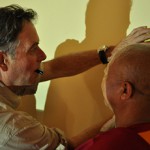
David Barker worked at San Francisco’s Exploratorium Science Museum from 1980 to 2013 as a Senior Designer and Art Director. He is currently working as a freelance designer and consultant for science museums and scientific organizations. At the Exploratorium, he created exhibits exploring visual perception and illusions. David’s exhibits are currently exhibited in many museums around the world. Having studied physics at the University of California at San Diego, David turned an interest in the relationship between science and perception into a studio art degree from UC Santa Barbara. David has worked with Science for Monks for ten years, helping with design and conception of My Earth, My Responsibility, an exhibition addressing climate change, and most recently The Secrets of Particles on quantum mechanics and Buddhist philosophy.
Years Participation: 2009, 2011, 2013, 2019
David Fresco, Kent State University
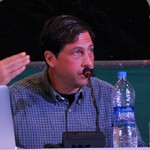
David M. Fresco is Professor of psychological sciences at Kent State University and Adjunct Associate Professor of psychiatry at Case Western Reserve University School of Medicine. He directs the Psychopathology and Emotion Regulation Laboratory (PERL) and is a Co-Director of the Kent Electrophysiological Neuroimaging Laboratory (KENL). His program of research adopts an affective science perspective to the nature and treatment of anxiety and mood disorders. Specifically, he conducts survey, experimental, and treatment research to examine factors associated with major depressive disorder (MDD) and generalized anxiety disorder (GAD) including metacognitive factors, peripheral psychophysiology, neuroimaging and electrophysiological techniques. Another focus of the PERL lab is the development of treatments informed by affective and contemplative neuroscience findings that incorporate mindfulness meditation and other practices derived from Buddhist mental training exercises. Much of Dr. Fresco’s NIH-funded treatment research has focused on the infusion of mindfulness into Western psychosocial treatments. He is Associate Editor for the Journal of Consulting and Clinical Psychology and is also a frequent reviewer for the National Institute of Mental Health, the National Center for Complementary and Alternative Medicine.
Julie Yu, Exploratorium
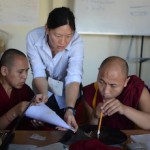 Julie Yu is a Senior Scientist in the museum’s Teacher Institute where she works with teachers to create hands-on activities for teaching math and science. With a broad interest in all sciences, she has a PhD in chemical engineering from the University of California, Berkeley, with a minor in molecular and cell biology. Since joining the Exploratorium, she has developed ways to do numerous science activities (from making batteries to gel electrophoresis) at a fraction of their typical cost. When not in the classroom, Julie is usually doing science in her kitchen, pursuing a tender roast or the perfect soufflé.
Julie Yu is a Senior Scientist in the museum’s Teacher Institute where she works with teachers to create hands-on activities for teaching math and science. With a broad interest in all sciences, she has a PhD in chemical engineering from the University of California, Berkeley, with a minor in molecular and cell biology. Since joining the Exploratorium, she has developed ways to do numerous science activities (from making batteries to gel electrophoresis) at a fraction of their typical cost. When not in the classroom, Julie is usually doing science in her kitchen, pursuing a tender roast or the perfect soufflé.
Years Participation: 2012, 2013, 2017, 2019
Lori Lambertson, Exploratorium
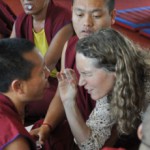
Lori Lamberston studied biology at the University of California at Santa Cruz, which led her to a career as a professional bicycle racer. She spent two years on the racing circuit, then returned to school to study painting, earning a Bachelor of Fine Arts degree from the University of San Francisco.
After completing the teaching credential program at San Francisco State University, she continued her work in education, completing a Master of Arts in Education. Lori has taught both math and science at the middle school level. Her math mentor, Mary Laycock, taught Lori to be a better math teacher, and even more important, inspired her to become a “math enthusiast”. Lori’s educational passion is integrating math and science. Lori joined the Exploratorium’s Teacher Institute (TI) in 1991. In addition to coordinating the Teacher Institute’s New Science Teacher Program, Lori enjoys joining her fellow TI staff educators and scientists developing math and science activities to share with teachers participating in TI programs. Since 2007, Lori has been instrumental in developing more environment focused learning opportunities for the teachers served by TI. As a life long learner, she also enjoys studying hula, learning Spanish, painting, gardening, cooking, and surfing.
Years Participation: 2010, 2012, 2014, 2019
Modesto Tamez, Exploratorium
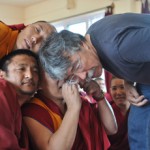 Modesto Tamez has been a science educator at the Exploratorium for nearly twenty five years. Before retiring his responsibilities include training middle and high school teachers to use activity-based science. “Cheap science” is Modesto’s motto and, in that spirit, he creates new curriculum involving mostly inexpensive or free materials. He has written articles on science pedagogy and is co-author of Math And Science Across Cultures, a book on the everyday math and science of cultures around the world. Modesto has also taught science methods courses for several universities in the Bay Area. Before joining the Exploratorium, Modesto was a science teacher for almost 18 years. He also taught lab science in Spanish to newcomer Latino students. Modesto received his training at the University of Illinois in Chicago, where he majored in geology and elementary education. He is an avid amateur photographer with a passion for view cameras and pinhole photography.
Modesto Tamez has been a science educator at the Exploratorium for nearly twenty five years. Before retiring his responsibilities include training middle and high school teachers to use activity-based science. “Cheap science” is Modesto’s motto and, in that spirit, he creates new curriculum involving mostly inexpensive or free materials. He has written articles on science pedagogy and is co-author of Math And Science Across Cultures, a book on the everyday math and science of cultures around the world. Modesto has also taught science methods courses for several universities in the Bay Area. Before joining the Exploratorium, Modesto was a science teacher for almost 18 years. He also taught lab science in Spanish to newcomer Latino students. Modesto received his training at the University of Illinois in Chicago, where he majored in geology and elementary education. He is an avid amateur photographer with a passion for view cameras and pinhole photography.
Years Participation: 2011, 2013, 2016, 2018
Scott Schmidt, Smithsonian Institution
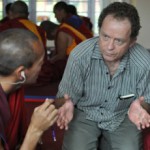
Scott Schmidt is the Chief of Graphics Production at Smithsonian Exhibits, the central exhibits design and production organization at the Smithsonian Institution in Washington DC. He has been managing exhibits production for temporary, permanent, and traveling exhibits for over a decade. Initially recruited in 2004 to build a series of unique exhibit components for the new National Museum of the American Indian, he found the process of collaboration necessary to the making of exhibits to resonate with his interests and past experiences. He was hired to manage the Fabrication Unit in 2007 and has since been engaged in exhibits development and production for projects in all the Smithsonian Museums as well as traveling exhibits. Trained in the arts, Scott Schmidt pursued his interests in working with materials as a designer and builder. For 25 years Scott owned and operated a business specializing in the design and fabrication of fine furniture, and prototype development services.
Years Participation: 2010, 2013, 2017, 2018
Paul Doherty, Exploratorium
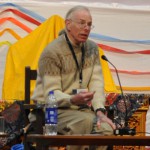
Paul Doherty graduated from the Massachusetts Institute of Technology with a PhD in physics. He was a tenured professor of physics for 12 years at Oakland University, Michigan, where he taught courses ranging from physics, astronomy, and geology to electronics, computer programming, and meteorology. In 1986 he came to the Exploratorium Teacher Institute, where he developed and taught workshops. He was the author of many books, including the Explorabook, The Exploratorium Science Snackbook, the Klutz Book of Magnetic Magic, Color of Nature, and Traces of Time. Paul received the Faraday Science Communicator award from the NSTA and was chosen as the “Best Science Demonstrator” at the World Congress of Museums in Helsinki in 1996. He played music on the whirly—a corrugated plastic tube. He was also a rock climber, and climbed the face of El Capitan as well as making the first ascent of a 20,000-foot peak in the Sierra Nevada de Lagunas Bravas in the Andes. Paul passed away in August 2017.
Years Participation: 2011, 2014, 2016
Curtis Gabrielson, Ministry of Education, Timor-Leste
Curtis “Curt” Gabrielson is the director of the Greenfield Community Science Workshop. For nearly a decade Curt worked in Timor-Leste to link science and mathematics concepts in the textbook with those of traditional Timorese life. Prior to teaching in Timor-Leste, he taught in China, San Francisco and the immigrant farm community of Watsonville, California, where he founded and directed a Community Science Workshop. The most recent of his four books in English is called “More Tinkering” and outlines the necessity of getting your hands dirty when you set out to learn something. Gabriel now works with a group of exceptional Timorese teachers under the Ministry of Education and Timor-Leste National Commission for UNESCO doing innovative curriculum development and training teachers from across the nation.
Years Participation: 2014, 2016, 2018
Vivian White, Astronomy Society of the Pacific
Vivian White volunteered with Project ASTRO more than a decade ago and fell hard for astronomy education while finishing her degree in physics. She is currently the Director of Free Choice Learning, administering the NASA Night Sky Network (NSN). A community of more than 425 amateur astronomy clubs across the country, NSN supports club outreach and events with an interactive website and webinars. She designs astronomy activities and demos specifically for informal settings, working with citizen scientists, Girl Scouts, Tibetan monks, and many others to expand the ways we learn astronomy out of school. Beyond the night sky, her passions include pottery, poetry, and social justice. She can often be found on rambling adventures in creeks and tide pools with her young child.
Years Participation: 2014, 2017, 2019
Laura Specker Sullivan, University of Washington - Seattle
Laura Specker Sullivan is an assistant professor in the Department of Philosophy at the College of Charleston. Before coming to Charleston, she was a research fellow at Harvard Medical School’s Center for Bioethics. From 2015-2017, she was a postdoctoral neuroethics fellow at the Center for Sensorimotor Neural Engineering (CSNE), University of Washington and at the National Core for Neuroethics, University of British Columbia. From 2013-2015, she was a visiting scholar at Kyoto University’s Kokoro Research Center, funded by a scholarship from the Crown Prince Akihito Foundation. She received her PhD in Philosophy from the University of Hawai’i in 2015. Her interest in cross-cultural ethics and neuroscience began at Williams College, where she received a grant to study the ethics of brain death and organ transplantation in Tokyo. This led her to teach English in Niigata, Japan from 2008-2009 with the JET Programme.
Years Participation: 2016, 2017, 2019
Tom Rockwell, Exploratorium
Tom Rockwell is Creative Director at the Exploratorium, San Francisco’s museum of science, art, and human perception. Since joining the Exploratorium in 2005, Tom has led the exhibits and media departments, the development of new galleries for the museum’s move to the waterfront in 2013, as well as the Geometry Playground exhibition and other National Science Foundation supported projects. His interests include exhibiting the human sciences, mathematics, and fundamental physical phenomena, as well as exploring the relationship between science, art, and religion. Prior to coming to San Francisco Tom founded and ran Painted Universe, Inc. where projects included exhibitions such as It’s a Nano World, The Enchanted Museum: Exploring the Science of Art, and illustrations for The Elegant Universe by Brian Greene.
Years Participation: 2017, 2018, 2019
Tracie Spinale, Smithsonian Institution
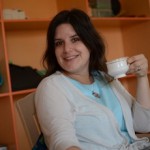
Tracie Spinale is a learning programs manager overseeing national programs across America and coordinates Smithsonian educational outreach globally. At Smithsonian Center for Learning and Digital Access (SCLDA), Tracie collaborates with communities worldwide to create cross-cultural and cross-disciplinary learning experiences. Tracie works on the Smithsonian Learning Lab, a new digital education platform that supports teacher and student-centered learning experiences. She also manages the Smithsonian Secretary’s Youth Advisory Council, SCLDA’s internship program, and the Fellowships in Museum Practice program. For ten years, Tracie was the director for internships at Smithsonian, providing training to 1,300 college students yearly. Tracie is a faculty member in the Sager Science Leadership Institute, supporting Tibetan monastic science leadership development by facilitating collaborative learning through the creation of community exhibitions—World of Your Senses (2010) and My Earth, My Responsibility (2015). She is interested in informal learning within museums inclusive of neurodiversity, and organized the Smithsonian’s first program for teens with cognitive and intellectual disabilities, All Access Digital Arts Program (2011–2016). Tracie holds a BA in Anthropology from Beloit College and an MA in Museum Studies from The George Washington University.
Years Participation: 2010, 2012, 2013
Stephanie Norby, Smithsonian Institution
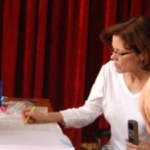
Stephanie Norby is the Director of the Smithsonian Center for Learning and Digital Access (SCLDA). Within the Institution, the Smithsonian Center for Learning and Digital Access (SCLDA) is a center of excellence focused on establishing the Smithsonian as a learning laboratory for everyone. As new technologies make it possible for audiences to connect with Smithsonian researchers, collections, and educational programs like never before, SCLDA’s mission is to coordinate among the museums and offices within the Smithsonian, provide models and methods that enable learners to access everything the Smithsonian has to offer, and empower learners to explore their own interests and engage with others. Stephanie also directs the creation of the Smithsonian Learning Lab, a new web-based platform for the discovery and creation of personalized learning experiences.
Years Participation: 2009, 2012
Marcel Bonn-Miller, National Center for PTSD
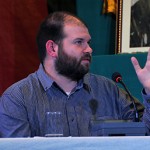
Dr. Marcel Bonn-Miller is an adjunct Assistant Professor of Psychology in Psychiatry at the University of Pennsylvania. He received his B.A. in psychology and Ph.D. in clinical psychology from the University of Vermont. He completed a pre-doctoral clinical psychology internship at the Palo Alto Veterans Affairs Health Care System and a postdoctoral fellowship at the Center for Health Care Evaluation at the Veterans Affairs Palo Alto Health Care System & Department of Psychiatry and Behavioral Sciences at Stanford University School of Medicine. After completing his VA Clinical Science Research and Development (CSR&D) Career Development Award (CDA-2), he transitioned into his position as Research Health Science Specialist at the VA Center of Excellence in Substance Abuse Treatment and Education (CESATE), National Center for PTSD (NCPTSD), and Center for Innovation to Implementation (Ci2i). Dr. Bonn-Miller’s research interests are broadly rooted in the examination of associations between substance use and anxiety symptoms and disorders. His current work involves the examination of the interrelations between cannabis use and its disorders and posttraumatic stress disorder (PTSD), including moderating and mediating processes underlying their associations for the purposes of treatment development and refinement.
Years Participation: 2014, 2015
Emiliana Simon-Thomas, University of California – Berkeley
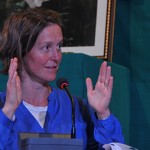
Emiliana Simon-Thomas is the science director of the Greater Good Science Center at the University of California, Berkeley. A neuroscientist who earned her doctorate from UC Berkeley, her research has explored the neuro-biological roots of pro-social emotion and behavior, as well as the psychosocial benefits of emotional authenticity and connection. A gifted teacher, Simon-Thomas has presented on the science of happiness and compassion to the Dalai Lama and audiences worldwide. She is a co-instructor of the online “Science of Happiness” course on edX that has reached more than 500,000 students worldwide.
Years Participation: 2011, 2014
Tammy Cook-Endres, Exploratorium
Tammy is a teacher in the Exploratorium’s Teacher Institute. Her primary role is to train and support coaches and mentors who work with novice science teachers in their first two years in the classroom and to develop life science content for teachers. A science educator for seventeen years, Tammy has taught elementary and middle school science and has mentored and coached novice science teachers through programs such as Peninsula Bridge, Breakthrough San Francisco, and the Exploratorium’s Teacher Induction Program. She earned her biology degree at the University of California, Santa Cruz, and her master’s degree in science education at Teachers College, Columbia University. A National Board Certified Teacher in Early Adolescent Science, she is passionate about crafting learning opportunities for all students that ignite a love of science.
Years Participation: 2013, 2015
Eric Muller, Exploratorium
Eric began his career as a geologist, wandering remote dirt roads in the American Southwest. After a few years, he decided to get his hands dirty and became a credentialed teacher. He taught chemistry, physics, geology, math, and at-risk-youth programming in Bay Area public schools. He joined the Exploratorium Teacher Institute in 1995 as a science, math, and technology educator. Eric has created numerous hands-on activities and conducted professional development workshops from Alaska to Costa Rica, China, and Tobago. He has written articles for The Science Teacher, The Physics Teacher, several museum publications, and various websites. He is the author of While You’re Waiting for the Food to Come, a book of science activities that can be done at restaurants. Eric earned a BS in earth science from the University of California, Santa Cruz, and an MA in education from Columbia University.
Years Participation: 2014, 2018
Rachel Sanders, Knowles Science Teaching Foundation
Rachel Sanders grew up in Newport, R.I., and became fascinated by the ocean as a teenager. In high school, she was inspired by her biology teacher whose “hands-on, observation-based style of teaching” helped her to develop a love for biology and scientific investigation. During college, Rachel honed her interest in marine science by participating in a year-long marine laboratory program in Washington State, Jamaica and Massachusetts. She enjoyed working as a teaching assistant but continued to focus on a career as a researcher. In the summer of 2007, Rachel joined the Peace Corps and began teaching biology at a rural high school in the Upper West Region of Ghana. She welcomed the challenges of teaching in a difficult environment. “The lack of laboratory equipment and teaching supplies forced me to focus on teaching methodology and to develop student-centered activities that took advantage of local resources.” The Peace Corps experience ultimately set her on the path of becoming a teacher. Rachel received a BA in biology from Bowdoin College in 2000 and a master’ degree in biological oceanography from Oregon State University in 2004. She taught introductory biology labs and biological oceanography at Dickinson College in Carlisle, Pa., before completing her secondary education credential at Humboldt State University.
Years Participation: 2016, 2017
Tom Meyer, State University of New York
In 2001, Tom Meyer co-founded the Hudson Valley Writing Project at SUNY New Paltz in New York. His first exposure to the National Writing Project, though, came in the 1980s when various Bay Area Writing Project (BAWP) teachers mentored him as a novice English teacher. Tom became a BAWP teacher-consultant in 1991. Over the years Tom has worked in various capacities as a Site Director and a regular contributor to NWP programming, research, and fund-raising initiatives. Meyer, a teacher or professor for nearly 25 years, currently teaches pre-service teachers courses related to curriculum and assessment, qualitative research, and literacy. Prior to his work in a university setting, he worked as a high school English teacher, an elementary natural science teacher, and for one semester, he taught art within a prison setting. Meyer graduated from the University of Michigan (BA) and Stanford University (MAT and a PhD).
Years Participation: 2017, 2018
Manish Jain, Center for Creative Learning, IITGN
Manish Jain graduated from the Indian Institute of Technology, Kanpur (1993) with a degree in Electrical Engineering. He also finished a few courses at Stanford. A chance meeting with Padmashree Arvind Gupta triggered him to dive into the space of popular science education full-time. Prior to that, he worked in the area of chip design for 19 years at Synopsys in Bangalore and Mountain View, California. Most recently he was a Director R&D leading the Low Power Simulation efforts. Currently, he heads the Center for Creative Learning at IIT Gandhinagar, which aims to provide an ideal space and environment to learn and understand concepts joyously; working hard to bring back the gleam in the eyes! Before CCL-IITGN, he worked at IUCAA Science Center in Pune. Manish has always had a passion for science and in 2013 he decided to spend all his energies to make education engaging and experiential. He spends a lot of time these days designing toys and activities, conducting workshops and teacher trainings and is passionate about sharing the magic with people. He is very interested in making esoteric science/research pedantic so that it can reach general populace and can speak in their language. Manish firmly believes this approach can revolutionize learning since toys speak the language that children understand.
Years Participation: 2017, 2019
Richard MacLehose, University of Minnesota
Richard MacLehose received his M.S. in epidemiology from the University of Washington and his Ph.D. in epidemiology from the University of North Carolina. His research interests include Bayesian statistics, epidemiologic methods, applied biostatistics, and reproductive and environmental health. This work translates across many different research projects, including studies about heart health; eating behaviors; occupational health and safety; and HIV support and prevention.
Years Participation: 2018, 2019
Tanya Baker, National Writing Project
Tanya Baker has been the director of National Programs at the National Writing Project (NWP) since 2007. Her primary interests are adolescents as readers, writers and learners and teachers’ professional development. She is particularly interested in connected learning and in working in the intersections of often separate spaces: formal and informal education; science and literacy; making and learning.
Years Participation: 2017, 2019
Caetano Amaral, SESIM Timor-Leste
Caetano Amaral was the coordinator of the national laboratory of natural physical science and mathematics in Timor-Leste for 3 years. Caetano is also a chemistry and physics teacher. He has been working for the national commission Timor-Leste for UNESCO for almost 7 years now, and with his team from SESIM (center for study for science and mathematics ) has already produced additional manuals and teachers guide for teachers in Timor-Leste. He is also a mentor for teachers of natural science and mathematics.
Years Participation: 2017, 2019
Tim Maudlin, New York University
Tim Maudlin (B.A. Yale, Physics and Philosophy; Ph.D. Pittsburgh, History and Philosophy of Science) has interests primarily focused in the foundations of physics, metaphysics, and logic. His books include Quantum Non-Locality and Relativity (Blackwell, 3rd edition now available), Truth and Paradox (Oxford) and The Metaphysics Within Physics (Oxford). Philosophy of Physics: Space and Time is in press, and should be published in 2012 by Princeton University Press. He is currently at work on a second volume for Princeton, and on a large project developing and applying an alternative mathematical account of topological structure. He is a member of the Academie Internationale de Philosophie des Sciences and the Foundational Questions Institute (FQXi). He has been a Guggenheim Fellow. He taught at Rutgers from 1986 to 2011, and has been a visiting professor at Harvard.
Years Participation: 2015, 2018
Don Gallehr, George Mason University
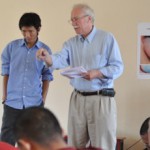
Donald R. Gallehr teaches advanced nonfiction writing, the teaching of writing, and theories of composition, as well as freshman and advanced composition in the disciplines. His articles include: “Portfolio Assessment in the College Writing Classroom,” in Process and Portfolios in Writing Instruction, NCTE, 1993; “Wait and the Writing Will Come: Meditation and the Composing Process,” in Presence of Mind: Writing and the Domain Beyond the Cognitive, Boyton/Cook, Heinemann, 1994; and “What is the Sound of No Hand Clapping: Using Secularized Zen Koans in the Writing Classroom,” in Spiritual Empowerment and Pedagogy, Boynton/Cook, Heinemann, 1997. His research interests focus on learning beyond the cognitive and its application to the classroom, and he currently serves as a reviewer for NCTE’s Journal of the Assembly for Expanded Perspectives on Learning. In addition, he is Director of the Northern Virginia Writing Project, Chair of the Board of Directors of the Virginia Writing Project, and he just finished serving on the National Writing Project Board of Directors (1991-2009). He is the recipient the 2008 David J. King Award (Teacher of the Year) to honor significant contributions for educational excellence at George Mason University.
Years Participation: 2010
Jess Parker, Smithsonian Institution
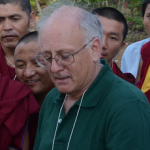
Jess Parker is the head scientist in the Forest Ecology lab at SERC. He received his Ph.D. from the University of Georgia in 1985 and has been a senior scientist at SERC since 1987. His current research projects include the development of a portable laser rangefinder system to measure forest structure and an exploration of how forest structure influences a range of canopy functions.
Years Participation: 2012
Karen Falkenberg, Emory University
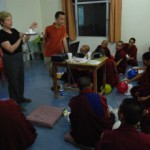
Dr. Karen Falkenberg is a faculty member with the Division of Educational Studies at Emory University, where she carries two appointments: first, as a Lecturer in the Division focusing on science education and special projects; secondly, as the Director of Undergraduate Education Programs for the Center for Behavioral Neuroscience, a National Science Foundation funded Science and Technology Center in its eighth year. In addition, she is the President of the Education Division of Concept Catalysts, Inc. Concept Catalysts consults internationally with businesses and education organizations.
Years participation: 2008
Karen Wilkinson, Exploratorium
As director of the Tinkering Studio, Karen WilkinsoI sees her role at the Exploratorium as an advocate for making as a way of knowing. She believes deeply in studio pedagogy, and the ability we all have to think with our hands. As an undergrad working in environmental design, she came to see museums as places that recognize this approach. Now, years later, she is even more committed to the idea that constructionism is an incredibly powerful way of learning, and that aesthetics matter a great deal. These two ideas are often overlooked in more formal education settings, outside of kindergarten or graduate school. Informal learning spaces for making and tinkering offer people a chance to connect to their own learning in a deeply personal way, which is why she is thrilled to be able to work with such a delightfully quirky group of people in the Tinkering Studio.
Years Participation: 2009
Mike Petrich, Exploratorium
Mike Petrich is curious about how people develop personal and unique understandings of the world for themselves. More specifically, his interest in how environments can be designed to foster learning and encourage deep thinking led to a graduate degree in education design and technology, and ultimately to a leadership role within the Learning Studio. With a background in fine arts, filmmaking, and photography, he applies the act of careful observation to much of his work as a facilitator. He has been working at this for 20 years, with audiences as diverse as museum visitors, primary school students, Tibetan monks, prison inmates, and graduate school researchers.
Years Participation: 2009
Barry Bruce, University of Tennessee
Barry Bruce, a professor in the Department of Biochemistry and Cellular and Molecular Biology, is a leading expert in sustainable energy research; his work focuses on adapting the biological machinery in plants to produce electricity and biofuels. Dr. Bruce is a highly recognized researcher and educator. He was recently recognized as a Fellow of the American Association for the Advancement of Science in 2014. In 2007, Forbes recognized Dr. Bruce as one of “Ten Revolutionaries That May Change the World”. This was an international recognition that is based on his seminal work on applied photosynthesis. He has published over 100 publications and has been invited to speak in over 15 different countries. UTK recently honored him with the Senior Faculty Research and Creative Achievement award, which is the highest award, offered to a scientist in the College of Arts and Sciences. Dr. Bruce is also a co-founder and associate director of the Sustainable Energy and Education Research Center (SEERC) and a co-principal investigator in the Sustainable Technology through Advanced Interdisciplinary Research (STAIR) program, one of the two NSF Integrative Graduate Education and Research Traineeship (IGERT) programs at UT Knoxville. He is also an adjunct professor in the Department of Microbiology and Chemical and Biomolecular Engineering.
Years Participation: 2014
Luigi Anzivino, Exploratorium
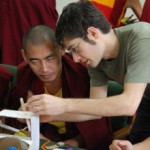
Luigi Anzivino wants to live in a world where people can learn by doing in messy, unusual, and inventive ways, without fear of failure. To help with that he contributes to the design, prototyping, and facilitation of hands-on making activities for the Tinkering Studio. After 24 consecutive years of formal education culminating in a PhD in Behavioral Neuroscience, he finally discovered informal education, constructionism, and tinkering when he became a Field Trip Explainer at the Exploratorium; he hasn’t missed academia since. In his work as a Professional Development Lead, he focuses on developing, documenting, and sharing with others in the field rich learning experiences, with the goal of creating a physical, cultural, and social space that is safe for trying out tentative ideas, not knowing the right answer, and developing the skill of posing—even more than solving—interesting problems.
Years Participation: 2009
Gaëlle Desbordes, Harvard Medical School
Gaëlle Desbordes is currently an Instructor (research faculty) at the Massachusetts General Hospital (MGH)-Harvard-MIT Martinos Center for Biomedical Imaging. Her main research interest is in the investigation of different types of meditation practices (e.g. mindfulness, compassion) from a neuroscientific perspective. She’s a member of the Mindfulness Research Collaborative. They were awarded a collaborative grant (NIH grant UH2AT009145) as part of the NIH Science of Behavior Change research program to study the impact of mindfulness training on self-regulation and adherence to medical regimen. She’s also one of the project leaders on an NIH-funded Center of Excellence for Research on Complementary and Integrative Health investigating central and autonomic nervous system mechanisms of a mindfulness-based intervention for migraine. She also collaborated with David DeSteno and Paul Condon to investigate how meditation training increases compassion. Their results were published in the journal Psychological Science (preprint) and have been featured in the New York Times and on WBUR.
Years Participation: 2013
Kathrine Shepherd, Kent State University
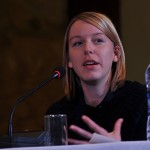
As a doctoral student in clinical psychology at Kent State University, Kathrine Shepherd has a broad interest in understanding the factors that predict adaptive responding to emotional challenges. In her research, she is particularly interested in the metacognitive process of “decentering,” or relating to internal experiences (e.g., thoughts and emotions) from a self-distanced, objective perspective, rather than identifying with them personally. Her research aims to elucidate the therapeutic effects and mechanisms of decentering, and the relationship of decentering capacity to individual differences in mindfulness, meditation training experience, emotion regulation, and mental health. She is also broadly interested in the neural mechanisms of automatic, or “incidental,” emotion regulation. Currently, she is working to elucidate the relationship of individual differences in emotional functioning and meditation experience to the spontaneous recruitment of emotion regulatory brain regions during negative emotional provocation and decentering.
Years Participation: 2014
Jim Lane, Knowles Science Teaching Foundation
Jim Lane grew up in Arden Hills, Minnesota, near 300 acres of wetlands and woods, where he spent the majority of his free time exploring. After high school, Jim enlisted in the United States Navy, qualifying for and completing the Naval Nuclear Power program. He served on-board the aircraft carrier USS Abraham Lincoln for four years as an analytical chemist and radiation control technician, completing two deployments to the Persian Gulf and Afghanistan. Jim was awarded a Navy Achievement Medal and two Good Conduct Medals for his service. Although his naval experience provided great opportunities, Jim knew his place was not in the belly of an aircraft carrier, but in front of a classroom. A graduate of the University of Minnesota with a BS in biology, Jim has worked as a summer camp instructor in St. Paul’s Como Park Zoo and an Interpretive Naturalist at Springbrook Nature Center, teaching subjects ranging from paleontology to plant biology. Since 2004, he has assisted in banding, releasing and monitoring Saw-whet owl populations in northeastern Minnesota as a research volunteer with the United States Forest Service. In 2009, Jim participated in summer training in support of Project IceCube, the world’s largest telescope built to detect neutrino particles and the biggest research project ever attempted in Antarctica. The training provided Jim and five other KSTF Fellows an opportunity to network with teachers and scientists involved in polar research and become part of the community of people bringing this research to high school science classrooms.
Years Participation: 2016
Christine Cziko, University of California - Berkeley
Christine Cziko was the coordinator of the Multicultural Urban Secondary English (MUSE) Master’s and Credential Program with University of California, Berkeley for 15 years. She is an emeritus faculty member at Berkeley’s Graduate School of Education and taught in public middle and high schools for 27 years. She is particularly interested in supporting secondary students to become engaged, fluent, and competent readers of the variety of texts they must master in order to succeed in higher education and in their lives outside of school. Cziko coauthored the book, “Reading for Understanding in Middle and High School Classrooms: A Reading Apprenticeship Guide” (1999). Her other writings include “Apprenticing Adolescent Readers to Academic Literacy” in Harvard Educational Review (2001); “Academic Literacy in an Urban High School,” in California English (1998); “Brother Can You Spare a Dime? Designing a Learning Expedition on the Great Depression,” in Journeys through our Classrooms (1996); and “Dialogue Journals: Passing Notes the Academic Way,” in Cityscapes: Eight Views from the Urban Classroom (1996). She also has been chosen as a Carnegie Scholar and member of the Carnegie Academy for the Scholarship of Teaching and Learning. Christine holds an M.A., from Lehman College, City University of New York.
Years Participation: 2009
Stephen Traphagen, Knowles Science Teaching Foundation
Stephen Traphagen’s commitment to teaching is rooted in his belief that self-improvement is a vital catalyst for the success of any undertaking. A long distance runner, Stephen experienced early on the far-ranging, positive effect of even small improvements. “The idea that I could be measurably (if only slightly) better one week than I was the last, really lit up my imagination.” Always interested in biology, Stephen earned a BS from the University of Iowa and a Masters of Science from DePaul University. As his fascination with self-improvement continued, he found himself wanting to “put someone else in a position to be just a bit better than they used to be.” His decision to teach was strengthened when, as a volunteer high school track coach, he watched one of his students improve not only his running but his entire attitude toward school. The student became the fifth best sophomore in his state, went on to college and was recently accepted to Harvard Law School. “I want to see more of this kind of impact. I can think of no better job than teaching to do that.”
Years Participation: 2009
Vicki Zhrzewski, Greater Good Science Center
Vicki Zakrzewski, PhD, is the education director of the Greater Good Science Center. Her articles (GGSC Magazine, Huffington Post, Edutopia, and ASCD’s Educational Leadership), talks, workshops, and GGSC Summer Institute for Educators around the world provide science-based ideas for promoting the social and emotional well-being of students, teachers, and administrators, as well as methods for creating positive school cultures. Examples of her recent consulting work for incorporating the life-enhancing science of compassion, empathy, gratitude, awe, and other social-emotional skills include: the Mind and Life Institute (of which she is a fellow), the Jim Henson Company on a new television show for preschoolers, the International School of Brussels on the Common Ground Collaborative character curriculum, the International School of Bangkok and Palo Alto Unified School District on integrating social-emotional learning into their work, and Pixar/Disney on The Emotions Survival Guide—a follow-up book for children based on the movie Inside Out. A former teacher and school administrator, Vicki earned her Ph.D. in Education and Positive Psychology from Claremont Graduate University. In her doctoral research, Vicki spent two months in India at a school awarded the Peace Education Prize by UNESCO and the Hope of Humanity Award by the Dalai Lama, researching their methods for developing teachers’ ability to create caring relationships with students. She’s previously worked with Kaiser Permanente’s award-winning Educational Theatre Programs, the Ball Foundation’s story project for personal transformation which helped bring systemic change to school districts, as a children’s playwright for a worldwide humanitarian non-profit, and as a curriculum developer.
Years Participation: 2017
George Musser is a contributing editor at Scientific American and Nautilus magazines and the author of two books, Spooky Action at a Distance and The Complete Idiot’s Guide to String Theory. He is the recipient of the 2011 American Institute of Physics Science Writing Award and the 2010 American Astronomical Society’s Jonathan Eberhart Planetary Sciences Journalism Award. He was a Knight Science Journalism Fellow at MIT from 2014 to 2015.
Years Participation: 2017
Jesse Early, Arizona State University
Jessica Early, associate professor of English at Arizona State University, is a scholar of English education and secondary literacy. She is the director of the English education and the Central Arizona Writing Project, a local site of the National Writing Project, at ASU. She initially began her career in the field of education as a high school English language arts teacher. Her research combines qualitative and quantitative methods to examine the teaching of writing and writing practices in ethnically and linguistically diverse secondary English Language Arts classrooms as well as the preparation and professional development of urban English Language Arts teachers.
Years Participation: 2018
Laura McCormick, Exploratorium
Lara McCormick is a designer, educator and author. She is currently a Creative Director at the Exploratorium, overseeing the brand and leading the design team. Formerly, she was Head of Design at the online education startup CreativeLive, and Art Director at the New York Times. She received her MFA in Design from the School of Visual Arts, and a post-graduate degree in typography from Cooper Union. She is the author of ‘Playing with Type: 50 Graphic Experiments for Exploring Typographic Design Principles’ published by Rockport Press. She has given presentations and workshops on design and typography for AIGA, AdobeMAX, Art Directors Club, SF Design Week, and TEDx. Her work has been featured in HOW magazine, PRINT, and Graphic Design USA. She is a two-time recipient of the Sappi ‘Ideas that Matter’ award and judged the Communication Arts Typography Annual in 2017. She is committed to design education, social activism and investigating change.
Years Participation: 2018
Shannon Morago, Humboldt State University
Shannon Morago has been teaching science and math in rural northern California since 1996, with a focus on serving students with exceptional learning needs and Native American youth. She has also led, supervised and instructed in teacher preparation at Humboldt State University (HSU) since 2003, with particular emphasis on inquiry and problem based teaching and learning. Her educational background includes a M.S. in Biology from HSU and a Doctorate in Education from U.C. Davis.
Years Participation: 2017
Karen Kalumuck, Exploratorium
Karen Kalumuck is a scientist, educator, and communicator who is passionate about creating and delivering life sciences materials and experiences to formal and informal science audiences. Her ability to tailor programs to K-16 audiences as well as the general public, has evolved through years of practical experience. After concluding a postdoctoral fellowship in the Molecular Biology of Human Disease, Karen decided that she had a passion and talent for education. She spent the next 8 years as a college professor, designing new courses, laboratories, and research experiences for undergraduates. Becoming interested in science literacy for the general public, Karen spent the next 19 years+ at the Exploratorium in San Francisco, CA. Karen developed and delivered the Exploratorium’s first Teacher Professional Development program in the Life Sciences. As a consultant and advisor, Karen has conducted curriculum design and review, served on journal editorial boards, reviewed grants and programs, given presentations to a wide range of audiences, and has taught Secondary Science Methods classes to graduate students preparing to be classroom teachers.
Years Participation: 2017
Dedra Buchwald, Washington State University
Dedra Buchwald held a joint appointment as Professor of Epidemiology in the School of Public Health and a Professor of Medicine at the University of Washington for 28 years. She now leads the Initiative for Research and Education to Advance Community Health (IREACH) at Washington State University, a large, integrated effort to improve the health of rural and minority people. Dr. Buchwald was the founding director of the Partnerships for Native Health, which encompasses research, education, training, advocacy, and technical activities nationwide with over 160 partners. Partnerships for Native Health has developed a program of culturally appropriate research that spans a wide range of topics, including physical, mental health, addiction, health services, and social issues in Native communities. Dr. Buchwald is the Director of the National Institute on Aging-funded Native Investigator Development Program, a two-year career training program for American Indian and Alaska Native post-doctoral fellows, designed to increase the number of independent Native researchers. She also directs two other career training programs for junior faculty and has received accolades and awards for her mentorship activities.
Years Participation: 2018
Sophia Oller, High Tech High International
Sophia Oller is a chemistry teacher at High Tech High International in San Diego, California. She graduated from the University of California, San Diego with a Bachelor of Science in Chemistry as well as minors in French, Theatre, and Education. During her undergraduate work, she also attended the University of California, Berkeley, and the Université de Lumières II in Lyon, France. She’s taught Chemistry and French in the San Diego area since 2010 and received her teaching credential and Master of Education from UCSD in 2011. Her project-based Chemistry class at HTHI was recently featured in the local newspaper when her students debuted science tours in four neighborhoods around San Diego which explored water quality, climate change, biochemistry, and geology.
Years Participation: 2019
Scott Stambach, Cuyamaca College
Scott has spent the last ten years teaching at the innovative project-based high school High Tech High in San Diego, CA. There, you could find his students discovering the laws of physics while they built high-powered space rockets and made electric guitars out of cigar boxes. In 2015, he began working with Science for Monks, combining his life-long passion for Buddhism with his love for education. Last year, Scott also published his first novel, The Invisible Life of Ivan, which was nominated for the Dublin Literary Prize. Currently, he teaches physics at Cuyamaca college and travels to India whenever possible to interview Tibetan monks and Lay teachers and share teaching practices.
Years Participation: 2019
Sonia Galaviz, Garfield Elementary School
Sonia Galaviz is a 5th grade elementary teacher in Boise, Idaho. She has taught in both the primary and intermediate grades and teaches as an adjunct faculty for University of Phoenix and Boise State University. In 2009, she received the honor of Idaho Woman of the Year from the Idaho Business Review. In 2011, Sonia was one of five educators in the nation chosen to receive an award in Excellence in Culturally Responsive Pedagogy from Teaching Tolerance. Sonia serves on the state board for the Idaho Education Association. Sonia won the NEA award for Teaching Excellence in 2017. She drives her students to reach beyond their limited means, disadvantages or advantages in their given situation, and to see things beyond what may be their limited scope of vision.
Years Participation: 2019
Kristine Panik, University of California, Berkeley
Kristi Panik, MD, is chief of psychiatry at University Health Services of UC Berkeley. Her practice inclines toward integration of mindfulness meditation with other tools of contemporary psychiatry. Interests: Holistic approaches for cultivating psychological wellness, incorporating mindfulness and meditation practices within treatment framework, transitioning off psychiatric medications, and autism and other developmental issues.
Years Participation: 2019
Ryan Jenkins, Wonderful Idea Company
Ryan Jenkins is the co-founder and lead educator of Wonderful Idea Company, a creative design studio in the San Francisco Bay Area that develops resources to support explorations of art, science and technology through making and tinkering. Previously he was a founding member of the Tinkering Studio, a maker space at the Exploratorium where visitors can experiment with real tools, materials and phenomenon.
Years Participation: 2019
Ian Durham, Saint Anselm College
Ian Durham is a physicist whose interests lie mainly in the deeper questions about the inner workings of the universe and the nature of reality. His two main areas of research focus on the intersection of quantum mechanics, relativity theory, and information theory, referred to as relativistic quantum information, and the foundations of physics, particularly the foundations of quantum mechanics and the nature of time. His research often touches on concepts in pure mathematics, astronomy, and even geology and engineering. He is a Professor and Chair of the Department of Physics at Saint Anselm College in Manchester, New Hampshire, an hour north of Boston.
Years Participation: 2019
Olandino Da Costa, SESIM Timor-Leste
Olandino da Costa has been a maths teacher in Timor-Leste for the past 12 years. He has been working for the national commission Timor-Leste for UNESCO for almost 7 years now, and with his team from SESIM (center for study for science and mathematics ) has already produced additional manuals and teachers guide for teachers in Timor-Leste. He also trains math teachers.
Years Participation: 2019
Alejandra León-Castellá, CIENTEC, Costa Rica
Alejandra León-Castellá was born in Costa Rica in 1958. She studied education and has specialized in Learning through inquiry, Science Communication, Observational Astronomy, and Everyday Mathematics (University of Costa Rica, University of Michigan, U.C. Berkeley, Exploratorium Museum of Science, Art and Human Perception, among others). She has been CIENTEC Foundation’s CEO since 1988. CIENTEC is a Costa Rican NGO that works with public and private institutions to promote science engagement, science communication and improvement of Science and Math teaching.
Years Participation: 2019
